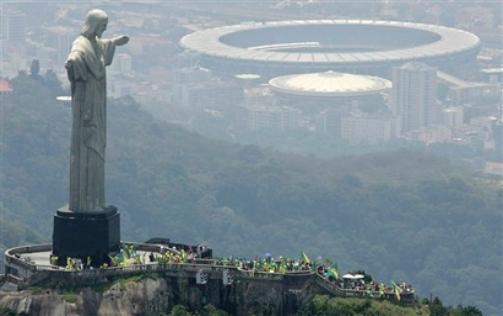By Andrew Warshaw in Zurich
October 20 – FIFA performed a complete U-turn today when they announced the preliminary match schedule for the 2014 World Cup finals in Brazil, forcing teams to fly the length and breadth of the country.
For months, FIFA and the local organisers had promised to bunch countries together in the group stages to prevent the kind of distances they had to ensure in South Africa last year.
Instead they scrapped that plan, throwing into even further doubt the infrastructural capabilities of a country that has been rocked by political and organisational snafus.
The one plus point in an otherwise unwieldy preliminary schedule is that FIFA has added a rest day between the end of the group phase and the start of the knockout section – effectively drawing a line under those who get eliminated early on.
“It’s been a big task,” said FIFA general secretary Jerome Valcke.
“We had 57 versions of this match schedule and finally nine on which we have been working.
“We took into account the medical aspect, logistics, travel and accommodation.
“Also, the host cities can have all the teams.
“They will travel around the country with seeded teams going to all the cities.”
The finals will use 12 venues, compared with nine in South Africa in 2010.
Hosts Brazil will play the opening match in Sao Paulo – at one stage a serious doubt because of stadium issues.
The five-time world champions will be able to hog the entire global limelight after FIFA announced that only one match instead of the usual two will take place on the first day of competition.
Group matches will kick off at 1pm, 4pm, 7pm and 10pm local time, the last of which represents the latest ever start for a World Cup and means European armchair fans will have to stay up until the early hours to watch.
Ricardo Teixeira, head of the World Cup Organising Committee, launched the schedule at a FIFA Executive Committee meeting here despite being under investigation at home for allegedly taking backhanders from FIFA’s former marketing agency.
Organisers argued, not entirely convincingly given how much travelling the fans will have to do as well, that the decision to move the teams around the country was the fairest way of making sure no one had an unfair advantage.
Ricardo Trade, head of operations for the tournament, said: “The climate is so different you do not want to give an advantage to one country over another.”
Contact the writer of this story at zib.l1745176736labto1745176736ofdlr1745176736owedi1745176736sni@w1745176736ahsra1745176736w.wer1745176736dna1745176736
Related stories
October 2011: Brazil faces race against time to get ready for World Cup admits President
October 2011: Brazil and FIFA come to agreement on 2014 World Cup
October 2011: Rousseff and Blatter meet to defuse revenues row
September 2011: Judge halts work on São Paulo airport delaying World Cup preparations
September 2011: Maracanã development hit by second strike in as many weeks

